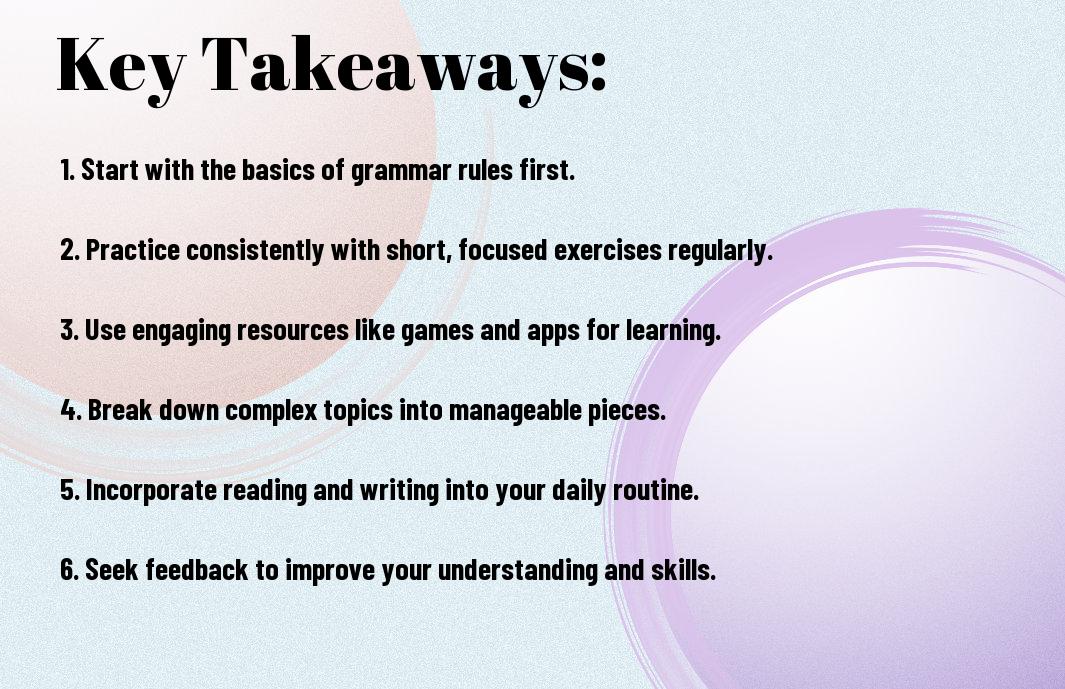As you initiate on your journey to learn grammar, you may feel overwhelmed by the numerous rules and Exceptions. Your goal is to become proficient, but the task seems daunting. You can start by breaking it down into manageable chunks, focusing on one aspect at a time. For guidance, you can visit tips to Study English Grammar Without Getting Bored and discover ways to make your learning process more enjoyable and effective.

Key Takeaways:
To learn grammar effectively without feeling overwhelmed, consider the following points:
- Focus on mastering the basics first, such as verb tenses, nouns, and sentence structure, before moving on to more complex grammar rules.
- Use practical exercises and real-life examples to practice grammar, making it more engaging and easier to understand, rather than just memorizing rules.
- Break down your learning into manageable chunks, setting achievable goals and tracking your progress, to help you stay motivated and avoid feeling overwhelmed by the amount of grammar to learn.
Setting Goals
Your approach to learning grammar should begin with a clear idea of what you want to achieve, allowing you to focus your efforts and track your progress.
Defining Objectives
Establishing a clear set of objectives helps you understand what you need to learn, enabling you to direct your attention to specific areas of grammar that require improvement.
Creating a Study Plan
To develop an effective study routine, you will need to break down your goals into manageable tasks, allocating time for each activity and setting realistic deadlines for completion.
Defining a study schedule that suits your needs and learning style is vital, as it enables you to make steady progress and maintain motivation, knowing that you are moving closer to your objectives with each passing day, and you can adjust your plan as you learn and grow.

Building Foundations
Some of the most effective methods for learning grammar involve starting with the basics and gradually building your knowledge. You will need to understand the fundamental principles of grammar, including parts of speech, verb tenses, and sentence structure. By establishing a solid foundation, you will be better equipped to tackle more complex concepts.
Learning Basic Rules
Previously, you may have found grammar rules to be confusing, but now you can approach them in a methodical way. You start by learning the basic rules, such as subject-verb agreement and noun declension, and then apply them to simple sentences. As you progress, you will become more comfortable with the rules and be able to use them in context.
Practicing Exercises
Meanwhile, as you learn the rules, you should also practice applying them through exercises. You can find many online resources that offer grammar exercises tailored to your level, from beginner to advanced. Between these resources, you will be able to practice your grammar skills in a variety of contexts.
Indeed, practicing exercises is vital to reinforcing your understanding of grammar rules. You will find that the more you practice, the more comfortable you become with using grammar in context. Your ability to apply the rules to real-life situations will improve, and you will start to develop your own writing style, using grammar to convey meaning and nuance in your writing.
Immersing in Language
Not long after you start learning grammar, you will find that immersing yourself in the language is necessary to your progress. You can do this by surrounding yourself with the language as much as possible, whether through TV shows, music, or conversations with native speakers.
Reading and Listening
One of the most effective ways to immerse yourself is by reading and listening to content in the target language. You can start with simple texts and podcasts, gradually increasing the difficulty level as your skills improve, allowing you to get used to the language’s rhythm and structure.
Speaking and Writing
Speaking directly to native speakers and writing in the target language will help you to practice your grammar skills. You will be able to test your understanding of grammar rules and get feedback on your mistakes, which is vital for your improvement.
Immersing yourself in speaking and writing activities forces you to think in the target language, applying grammar rules naturally. As you engage in conversations and write texts, you will develop your ability to use grammar correctly, and your communication skills will become more spontaneous and fluent, helping you to express your thoughts and ideas more effectively.
Overcoming Challenges
Many learners face difficulties when trying to learn grammar, but with persistence and the right approach, you can overcome these obstacles and achieve your goals. You will encounter challenges, but by acknowledging and addressing them, you can continue to make progress and improve your understanding of grammar.
Identifying Common Mistakes
Behind every mistake lies an opportunity to learn and improve, so take note of your errors and use them as a chance to refine your skills. You will begin to notice patterns in your mistakes, allowing you to focus your efforts on areas where you need the most improvement.
Seeking Help and Resources
Above all, do not be afraid to ask for help when you need it, as seeking guidance is a key part of the learning process. You can find numerous resources available to support your learning, from online tutorials to language exchange partners, to help you navigate difficult concepts and stay motivated.
Common challenges that you may face when seeking help and resources include finding reliable and engaging materials, as well as staying committed to your learning goals. You can address these challenges by exploring different types of resources, such as podcasts, videos, and language learning apps, to find what works best for you and your learning style. By doing so, you will be able to overcome obstacles and continue making progress in your grammar learning journey.
Staying Motivated
Keep your goals in mind and celebrate small victories to maintain enthusiasm for learning grammar. You will encounter challenges, but persistence is key to making progress. Stay focused on your objectives and you will be more likely to stay motivated throughout the learning process.
Finding Study Groups
Among the most effective ways to learn grammar is to join a study group, where you can engage with others who share your interests and goals. You can learn from one another, share tips, and stay accountable, making the learning process more enjoyable and interactive.
Tracking Progress
About the most significant aspect of learning grammar is monitoring your development, which helps you identify areas that need improvement. You can use various tools, such as journals or mobile apps, to track your progress and adjust your approach as needed.
This process of tracking your progress allows you to reflect on your strengths and weaknesses, enabling you to make informed decisions about your learning strategy. By regularly evaluating your progress, you can refine your approach, set realistic targets, and make steady progress towards mastering grammar, which in turn will help you stay motivated and engaged in the learning process.
Advanced Techniques
Once again, you will find that mastering grammar requires dedication and persistence. Consider the following:
- Practice consistently
- Review regularly
| Technique | Description |
|---|---|
| Drills | Repetitive exercises |
Analyzing Grammar Structures
Among the various methods, you will discover that analyzing grammar structures is vital. You will break down sentences to understand how they work, and this will help you to identify patterns and improve your overall grasp of grammar.
Applying Grammar in Context
Around the time you start applying grammar in context, you will notice significant improvement in your language skills. You will learn to use grammar in real-life situations, making your learning more effective.
It is at this stage that you will start to see the benefits of your hard work, as you begin to apply grammar rules in your writing and conversation, and your communication becomes more accurate and fluent. You will be able to express yourself with confidence, and your language skills will improve dramatically.
To wrap up
As a reminder, you have the power to learn grammar at your own pace. You can break down complex rules into manageable chunks, focus on your weaknesses, and practice consistently. By doing so, you will gradually build your confidence and develop a solid understanding of grammar, making your learning journey less daunting and more enjoyable, allowing you to improve your language skills effectively. Your progress will be steady, and your grasp of grammar will become more secure over time.
FAQ
Q: What is the best way to start learning grammar without feeling overwhelmed by the numerous rules and exceptions?
A: To begin learning grammar without feeling overwhelmed, it’s important to start with the basics. Begin by understanding the parts of speech, such as nouns, verbs, adjectives, and adverbs. Focus on one topic at a time, and make sure you have a solid grasp of each concept before moving on to the next. Utilize online resources, grammar workbooks, or language learning apps that provide interactive and engaging lessons. Breaking down your learning process into manageable chunks will help you stay focused and motivated.
Q: How can I practice grammar effectively without getting bored or overwhelmed by the complexity of the rules?
A: Practicing grammar can be engaging and fun if you incorporate it into your daily activities. Try to read books, articles, or news in the language you’re learning, and pay attention to how grammar is used in context. Watching TV shows or movies with subtitles can also help you see grammar in action. Additionally, speaking with native speakers or language exchange partners can provide you with opportunities to practice your grammar skills in conversations. You can also use language learning apps that offer interactive exercises, quizzes, and games to make grammar practice more enjoyable and challenging.
Q: Are there any resources or tools that can help me learn grammar in a structured and organized manner without feeling overwhelmed by the amount of information?
A: Yes, there are many resources and tools available to help you learn grammar in a structured and organized way. Grammar textbooks, online courses, and language learning platforms often provide a step-by-step approach to learning grammar, with lessons and exercises that build on each other. You can also use flashcards to help you memorize grammar rules and exceptions, and create a schedule to track your progress and stay on track. Furthermore, joining a language learning community or finding a study buddy can provide you with support and motivation, and help you stay engaged and focused on your grammar learning journey.

